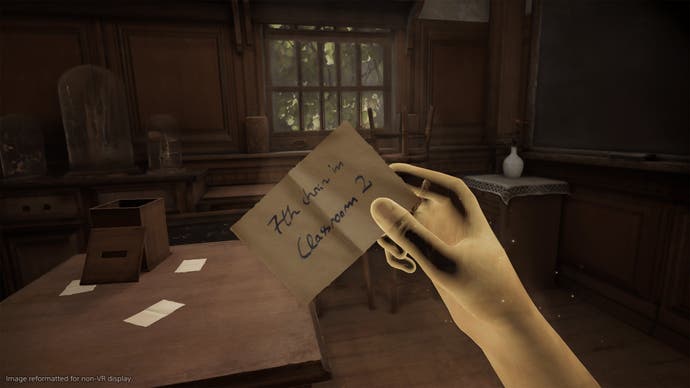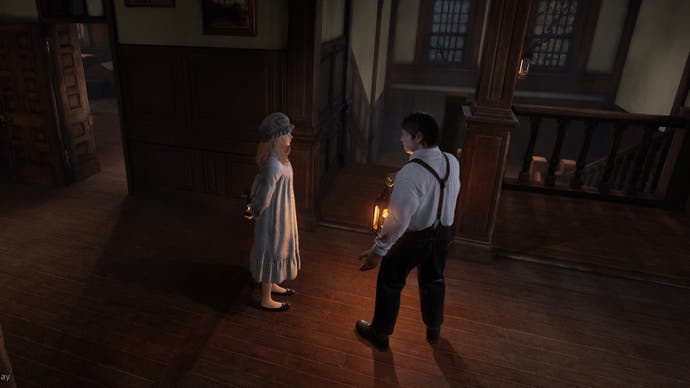VR and the act of seeing
Eyes wide shut.
My uncle is blind. I don't think he sees nothing at all, though. I don't think that's how blindness necessarily works. I think he sees lights and shapes but not too much that he can really make practical use of. I gather, and mine is a very limited understanding, that blindness is a spectrum.
You might hope that my uncle's experience of blindness - I love him very much, and despite the geographical distance I think we are close - would make me very aware of my own privilege of sight. But of course I largely take it for granted. I am long-sighted, so I often complain about newsprint and how small everything is on my monitor, and multiple sclerosis meant that I had a period of double vision a few years back which lasted for several weeks and was extremely odd and unsettling. But then it went away, thankfully, and since then I haven't really given my own sight much thought. More fool me, obviously, because sight is fascinating.
And the thing that has finally made me realise this is VR. PSVR to be more precise. I have spent the last few months with things like Tetris Effect and Déraciné, the last of which is a sort of experimental adventure game from the people behind Dark Souls and Bloodborne. I say experimental - in fact it's a very traditional, even slightly boring adventure game. You explore, you collect items and you think of ways that they might be useful for advancing the scenarios you find yourself in. But what I've realised is that in the muddle of all these boring tasks, I look at things more. I look closely at the things in my inventory - dead flowers, ornate keys, a dead mouse at one point - and I look more intently at the surroundings in which I find myself. Déraciné is set in a Victorian school or orphanage or some such. Many games take you to places like this, and yet here I stare in wonder at everything I see: the chalk boards, the prints of birds, the rugs that have lumps and folds in them, the stacks of books on counters and the brass handles on the wooden doors.

Déraciné plays into this to a certain extent. It's often a sort of pseudo-hidden object game, in that way that a lot of adventure games are. It has a crouch button, which is purely there to allow you to see under things, or to view scenes at floor level, to catch objects and details you might otherwise have missed. As a result, it's a game in which all the characters have quite carefully modelled footwear, and in which the warp and weft of the floorboards is attended to with a surprising degree of artistry. But beyond all that, I stare at Déraciné in much the same way I stare at all the VR games I've played. They place a huge premium on the act of seeing. For sighted people like myself, they are a chance to get a fresh understanding of how interesting it is to be able to see.
I've realised this, I think, because at the same time as I've been playing Déraciné, I've been finishing up The Mind's Eye, by Oliver Sacks. It's a selection of case histories, all of which hinge on the impact of neurological disease on vision - the mechanics of vision and the processing of visual information. It is, as is always the case with Sacks, an absolute wonder of a book - caring and probing and fascinating, a deep examination of the human condition and the ways in which neurological patients make a rich life for themselves in the face of illness. I was particularly struck by Sacks' own story of his own loss of stereoscopic vision when cancer took the sight in one of his eyes. Ever since reading this piece, I've been walking around and experimenting, closing one eye and then the other and trying to understand whether or not I'm one of those people who has sight in both eyes but still struggles to see in three dimensions.
Out in the real world, walking about in Brighton and testing one eye and then the other and then both on the trees, statues, fences and buses and whatnot I pass every day, I have found it surprisingly difficult to tell whether I have stereoscopic vision - or rather I struggle to see what changes, or to detect any flattening of the world around me, when I close one eye. But then I loaded up Déraciné the other day and the whole place was a sudden riot of stereoscopy. The world around me quickly settled in at various depths, and I was left marvelling at the way one classroom is visible in the distance through a dusty window, or the way in which one of the game's main characters suddenly leans towards me during a cut-scene, moving into what I would otherwise perceive as my own space.
It was the same with all the other VR games I've played I think: there's always a period of being mesmerised by the surroundings. The way the robot scampers up and over me in Astro Bot: Rescue Mission, or the manner in which Lovecraftian horrors - and they really are Lovecraftian for once - lurch out of the cold in Edge of Nowhere. But this period of being mesmerised doesn't really seem to end. The moment you put a headset over your eyes, you are telling yourself that your eyes are in for something very special, I think. And then there's the fact that the private theatre darkness of VR puts the rest of the world out of reach. Vision becomes a feature - a special effect. It becomes the main event. And at the same time, my own vision is revealed as the marvel that it always has been. I get to see the privilege that is being able to see.

